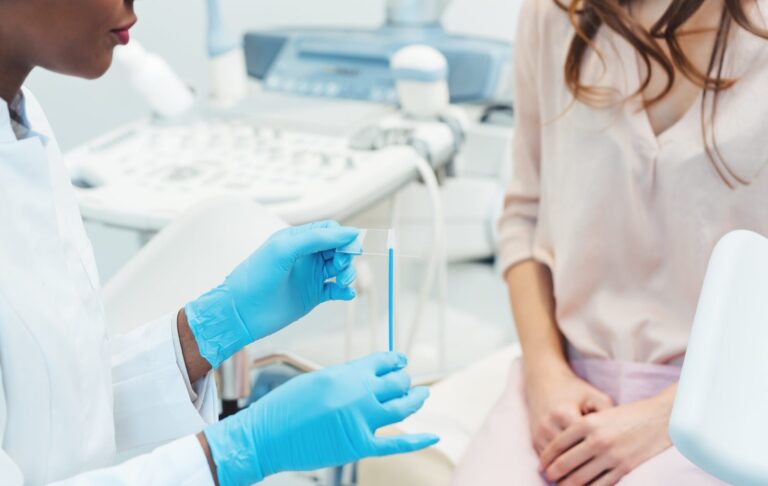
If you are sexually active (definition: any activity that involves touching someone’s genitals), it is very important to get tested for STIs. This is to not only ensure your safety, but also the safety of your sexual partner.
If you are sexually active (definition: any activity that involves touching someone’s genitals), it is very important to get tested for STIs. This is to not only ensure your safety, but also the safety of your sexual partner.
A Public Health England report on STI diagnoses in England in 2021 revealed 93,545 chlamydia diagnoses, with 317,901 STI positives in general. The frequency of testing also fell by 25% between 2020 and 2021.
Today, we’re going to be looking at the importance of STI testing and when you should be doing them.
Why don’t people get regular STI testing?
Unfortunately, sometimes people decide that they don’t want to get tested for a variety of reasons. Usually, these individuals don’t get tested because they hold incorrect information about STIs and how they are spread. And, on other occasions, the hesitancy to get tested may be due to societal factors such as worrying about what people will think of them if they test positive.
- No Symptoms: One big reason people don’t get tested is because they claim to not have any symptoms. However, lots of STIs such as chlamydia and gonorrhoea don’t always show symptoms. This means a lot of people have an STI without actually knowing they do. This is why it is important to get tested every time you have sex with a new partner.
- Long Term Relationship: People think that because they have been in a long-term relationship, they don’t need to get tested. But you never know and unforeseen circumstances are just that – unforeseen. Experts recommend that even if you’re in a long-term relationship, you need to get tested about once a year.
- Too Much Effort: Health management can be laborious and annoying but this is not only about your safety but also the safety of your sexual partners. Getting tested for STIs is, in fact, a very quick process. It is usually a swab of the vagina, mouth or anus or a blood/urine sample. There are countless sexual health clinics, GPs, walk-in clinics and even home testing kits! Doesn’t sound like much effort, does it?
- Social Opinions: Contrary to what you think, testing positive for an STI does not reflect on your personality or hygiene. There is no place for judgement regarding your consensual sexual activity. And, it’s not like every positive result is blasted on the megaphone! Your diagnosis is yours and should only be shared with your current and past sexual partners. Remember: STIs are just like any infection and need to be dealt with quickly.
Why should you get regular STI testing?
Anyone can have an STI … including you!
- Even if you have only taken part in sexual activity once, you could still have an STI. Anyone can get an STI and they may not realise when it happens. Furthermore, the most common STIs, chlamydia and gonorrhoea, often don’t show symptoms. That means you or your partner could have it without realising. So why not get tested every now and again to be safe rather than sorry?
Condoms aren’t always effective
- We all know that condoms have a 99% prevention rate but they aren’t always effective, especially if they have been put on incorrectly or compromised by other factors such as lube. Furthermore, STIs such as pubic lice, genital warts or herpes can be spread by contact between genital areas that aren’t protected by a condom. Again, how will you know unless you get tested?
STIs have serious consequences if left untreated
- As mentioned above, chlamydia and gonorrhoea are the most common STIs and if left untreated, they can cause infertility. Furthermore, other STIs such as HIV and syphilis can be fatal if not picked up early and managed. Why aren’t you regularly testing again?
Treatment is quick and easier than you expect
- STIs can be treated very easily using antibiotics. HIV can be managed using an anti-viral medication that prevents it from being passed on to your sexual partners. This is why it is important to get tested regularly; you give yourself a chance to catch STIs early, so you can treat and manage it far better.
How often should I get tested?
According to the Centers for Disease Control and Prevention, everyone between the ages of 13 and 64 should be tested for HIV at least once during their lifetimes. However, more frequent testing is required because of more common and rampant STIs. To make it easier for you, we’ve put together some informed guidelines for how often you should get tested below:
- If you’re in a dry spell but had sex within the last year: you should get tested for gonorrhoea and chlamydia if you have a new partner or have unprotected sex.
- If you’re in a dry spell but test negative after your most recent sexual encounter: first of all, well done for testing way back when but you may want to test again. Certain tests don’t show infections until the twelfth week after infection. You may have got tested too soon for the disease to be present.
- If you’re having casual sex: if you have multiple partners or if you are not using protection, then you need to increase your frequency of testing. The recommendation is to up testing to once at least every six months.
- If you’re in a relationship: first of all, get tested at the start of the relationship as a sign of trust and openness. You will enter your relationship with confidence and an understanding of your partner’s status. You then need to define how you test as a couple. This can be once every 6 months for safety, or once a year like standard practice.
- If you have previously tested positive: In this case, you will already have a treatment plan in place for the six months post testing positive for the first time. Often, in these situations, you will be advised to test every 6 months if not even more regularly so that you stay in control of your health.
Get regularly tested if you’re sexually active!
STIs are way more common than you think. The only way to safeguard yourself and your partner against STIs is to be regularly tested. This puts you fully in control of your sexual activity, health and relationship. It also, should you test positive, give you the best possible chance at treatment and management.


